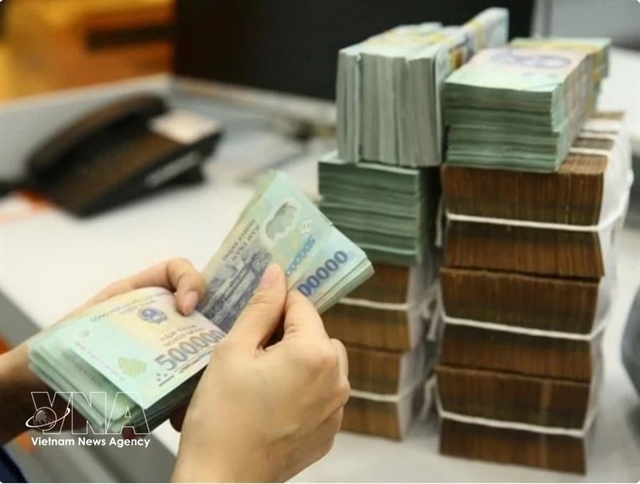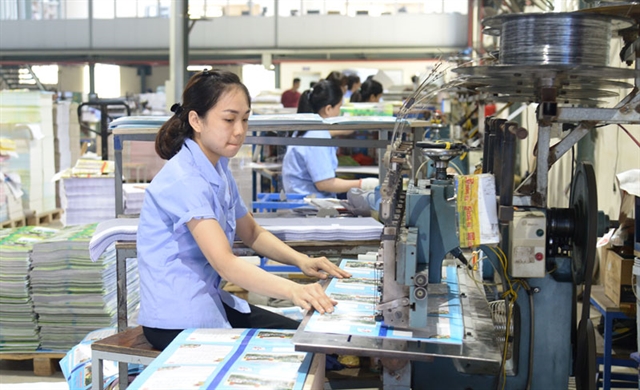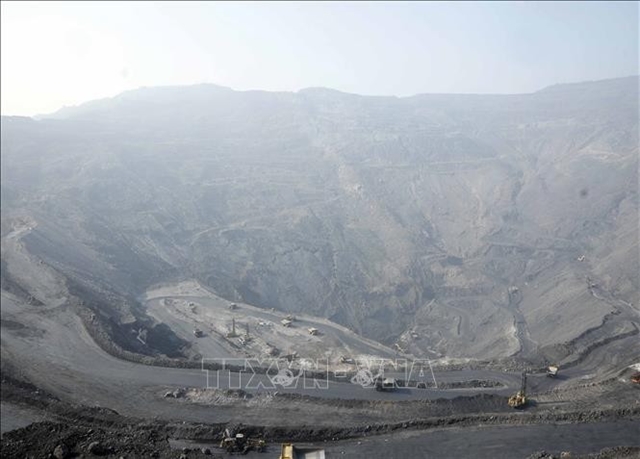 Economy
Economy

The Việt Nam Institute for Economic and Policy Research (VEPR) forecasts Việt Nam's gross domestic product (GDP) to rise 5.3 per cent for this year in its annual Việt Nam economic report 2020 released on June 17 in Hà Nội.

|
| Production at the Hồng Hà Stationery Company. The VEPR forecasts national inflation this year to be 3.5-4 per cent. — Photo kinhtedothi.vn |
HÀ NỘI — The Việt Nam Institute for Economic and Policy Research (VEPR) forecasts Việt Nam's gross domestic product (GDP) to rise 5.3 per cent for this year in its annual Việt Nam economic report 2020 released on June 17 in Hà Nội.
The institute has given this optimistic scenario because Việt Nam ended social distancing in April, earlier than scheduled in late May. That has allowed economic activities to gradually return to normal.
However, economic activities in the fields of tourism, accommodation and passenger transport are being restored gradually. The worst impacts of COVID-19 are expected to decline in the second quarter, according to the report.
In the second scenario on economic development, the national GDP growth rate would be 3.9 per cent if many important economic and financial centres in the world extend the period of lockdown until the end of the third quarter and even until the fourth quarter of this year.
With this scenario, the pandemic would create more serious impacts on the agriculture, forestry, fishery, manufacturing, processing and service sectors.
In the worst scenario, the institute estimated that the GDP growth will be only 1.7 per cent.
The VEPR also forecasts national inflation this year to be 3.5-4 per cent.
According to the report, there are many factors that can support GDP growth until year-end, such as the effectiveness of the EU-Việt Nam Free Trade Agreement (EVFTA) and ratification of the EU-Việt Nam Investment Protection Agreement (EVIPA).
Other factors include the Government’s efforts to speed up disbursement of public investment capital as well as construction of key public investment projects, low cost of raw materials and fuel and advantages of many other free trade agreements.
Meanwhile, since the beginning of June, many countries worldwide have also ended lockdowns due to the pandemic, that helps Việt Nam to promote exports in the second half of this year.
However, there were still many unfavourable factors for economic growth such as high fiscal deficit and low budget for development investment.
They included weak health of the banking-finance system and dependence of economic growth on the foreign direct invested sector.
In addition, the nation has had low efficiency in public investment, slow equitisation of State-owned enterprises and inadequate business environment.
"If those factors are not improved, they would affect economic recovery in the short term and even Việt Nam’s economic stability in the long term,” said VEPR chief economist Phạm Thế Anh.
Therefore, VEPR has recommended short-term policies to minimise the negative impacts of COVID-19, and long-term policies to improve macro economy and minimise risks in the future.
In all situations, inflation, interest rates and exchange rates need to be maintained for the post-pandemic economic recovery.
Việt Nam needs to diversify export and import markets. That would help the nation avoid dependence on other countries.
It also should continue efforts to improve the business environment, according to VEPR.
In addition, VEPR experts said, Việt Nam is an emerging economy, participating in many major FTAs such as the CPTPP and EVFTA, so Vietnamese goods enjoy tax incentives when exported to the EU, US, and Japan markets. This is an opportunity for Vietnamese businesses and foreign businesses that have invested in Việt Nam and will come to this market in the future.
However, they warned that "Việt Nam should be careful to not become a transit place for Chinese and South Korean goods to export to the US with preferential tax.”
Therefore, Việt Nam should closely monitor regulations on origin to avoid risk of lawsuits on this issue.
The Government should also review incentives in tax and land for FDI businesses to create fairness in business for local enterprises, according to VEPR. — VNS




